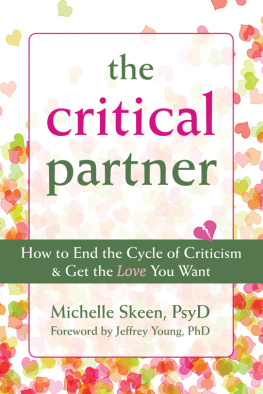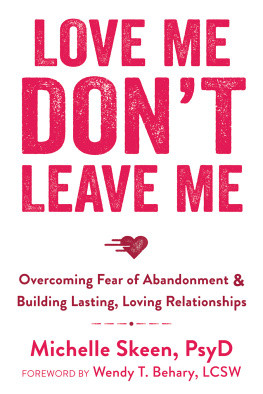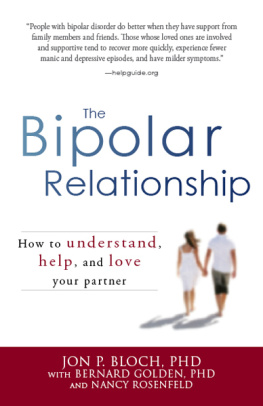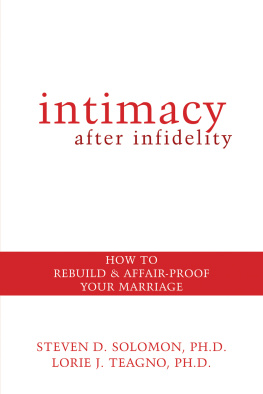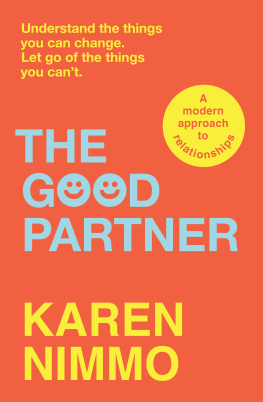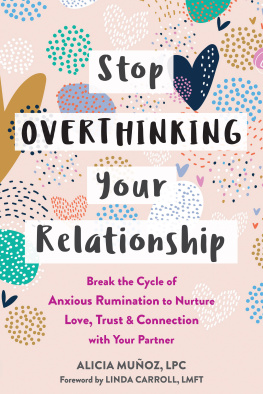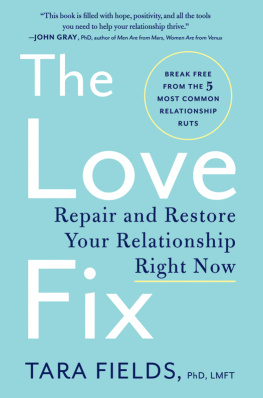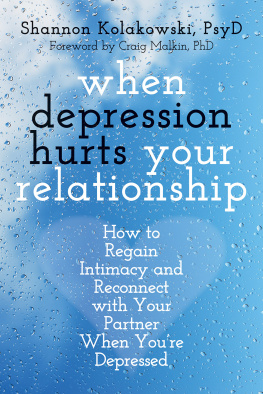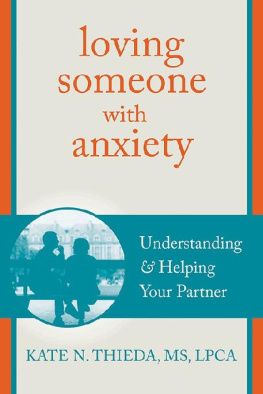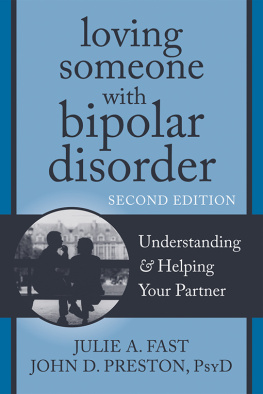
Michelle Skeen, PsyD, has studied schema therapy under Matthew McKay and Jeffrey Young. She completed her postdoctoral work at the University of California, San Francisco, and maintains a private practice in San Francisco, CA, where she lives and works. She is coauthor of the forthcoming Acceptance and Commitment Therapy for Interpersonal Problems.
Foreword writer Jeffrey Young, PhD, is founder of schema therapy, director of the Schema Therapy Institute of New York, and a faculty member at Columbia University College of Physicians and Surgeons. He is author of Schema Therapy: A Practitioners Guide and Reinventing Your Life.

Like a good detective novel, Michelle Skeens book will help you uncover the mystery of your difficult relationship. After reading this book, youll understand how your childhood experiences still affect your life, but more importantly, youll learn what you can do to put them behind you and move on.
Jeffrey C. Wood, PsyD, psychologist and coauthor of The Dialectical Behavior Therapy Skills Workbook
The couples in successful relationships will tell you that, in order to succeed, partners must learn to work on their relationships. The Critical Partner is the ideal workbook to help couples who are dealing with this uncomfortable dynamic. It will teach them how to do what is necessary to make their relationship successful.
Barton Goldsmith, PhD, author of Emotional Fitness for Couples and Emotional Fitness for Intimacy
The Critical Partner is required reading for anyone living in a relationship where they feel frequently hurt, devalued, or blamed. This book will show you why this happens and give you tools to do something about it. Highly recommended.
Matthew McKay, PhD, author of Thoughts and Feelings
The most challenging issue in the life of the couple can be learning how to express disappointment and hurt without hurting your partner. Michelle Skeen offers an effective framework for understanding and dealing with the ruptures and self-defeating consequences of criticism in a relationship. She carefully applies the thoughtfully designed elements of schema therapy to her keen knowledge of this subject matter and offers her readers easily accessible strategies for transforming painful life patterns into healthy responses.
Wendy T. Behary, LCSW, author of Disarming The Narcissist
Publishers Note
This publication is designed to provide accurate and authoritative information in regard to the subject matter covered. It is sold with the understanding that the publisher is not engaged in rendering psychological, financial, legal, or other professional services. If expert assistance or counseling is needed, the services of a competent professional should be sought.
Distributed in Canada by Raincoast Books
Copyright 2011 by Michelle Skeen
New Harbinger Publications, Inc.
5674 Shattuck Avenue Oakland, CA 94609
www.newharbinger.com
Cover design by Amy Shoup; Acquired by Catharine Meyers; Edited by Nelda Street
All Rights Reserved
ePub ISBN: 978-1-60882-599-8
The Library of Congress has cataloged the print edition as:
Skeen, Michelle.
The critical partner : how to end the cycle of criticism and get the love you want / Michelle Skeen.
p. cm.
Includes bibliographical references and index.
ISBN 978-1-60882-027-6 (pbk. : alk. paper) -- ISBN 978-1-60882-028-3 (pdf e-book : alk. paper)
1. Criticism, Personal. 2. Interpersonal conflict. 3. Couples--Psychology. 4. Man-woman relationships--Psychology. I. Title.
BF637.C74S54 2011
158.24--dc23
2011029637

This book is dedicated to my children: Eric, Jake, and Kelly. Your love, support, humor, intelligence, and appreciation serve as a constant reminder of what is important and possible in life. I love you deeply.
Foreword
It is a great pleasure to write this foreword to The Critical Partner. It is gratifying to read an excellent expansion of the schema therapy approach that can help so many people who are in painful, destructive relationships because they have partners who are highly critical of them.
A common issue among couples is criticism. I frequently work with couples in which one partner in the relationship is openly and consistently critical of the other (the critical partner). Over time this interaction has a destructive effect on the relationship, and on the well-being of the partner who is the victim of the criticism (the vulnerable partner). Often both partners in a relationship become locked into a maladaptive, repetitive cycle that they dont understand and find difficult to change.
This book first provides the reader with a way of understanding these destructive cycles through the concepts of schema therapy and the use of our assessment tools. Readers learn new and more effective strategies, based on schema therapy principles, to change the critical partner and to break their self-defeating patterns of interaction.
Using schema therapy as a framework, you will gain a deeper understanding of yourself, your partner, and the early childhood experiences in both of your families that shaped the relationship you are in. This deeper understanding of your own early maladaptive schemas, as well as those of your critical partner, will enable each of you to view the other with a level of compassion that you did not have before.
Michelle first presents case studies of couples that are in crisis as a primary result of the critical behavior of one partner. Each of the stories illustrates one of the five primary schemas of the critical partner. This is followed with assessment tools you can use to determine your partners schemas. This assessment process is informative and empathy-building. It highlights what I consider one of the real strengths of the schema approach: developing compassion for ourselves and others through understanding our early maladaptive schemas, and how they developed as a result of painful childhood and adolescent experiences.
The next section of the book presents case studies of the five primary schemas in the vulnerable partner, along with assessment tools to help you figure out your own primary schemas. Michelle then explains the importance of coping behaviors. Coping behaviors are responses to schema triggering events that we all develop as ways to protect ourselves when we feel we are under threat. However, in the long run, these coping behaviors cause harm to ourselves and to our partners.
The final two chapters deal with change. Michelle teaches new coping strategies you can use to deal with your schemas and with your partner in healthier ways. You will also learn how to react to schema triggering situations more effectively.
Changing our intimate relationships is not easy. Our emotions, beliefs, and behaviors began early in our lives and are now deeply entrenched. Nevertheless I am confident that readers of this book who have critical partners can make dramatic progress in improving their relationships by working hard to understand and then follow the principles outlined in this book. Doing this requires patience and compassion, but the payoff in improving your relationship will make all the effort you put in worthwhile.

